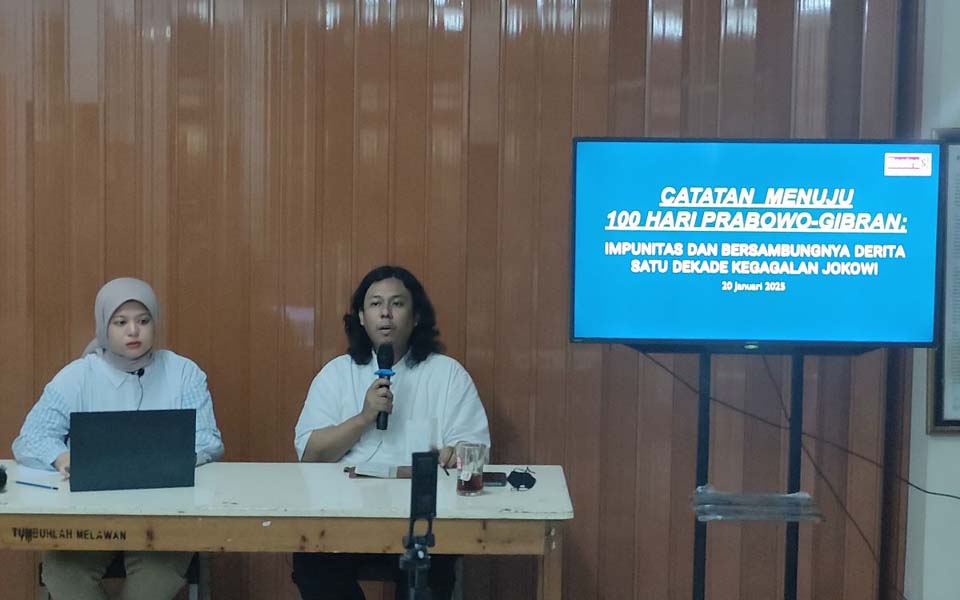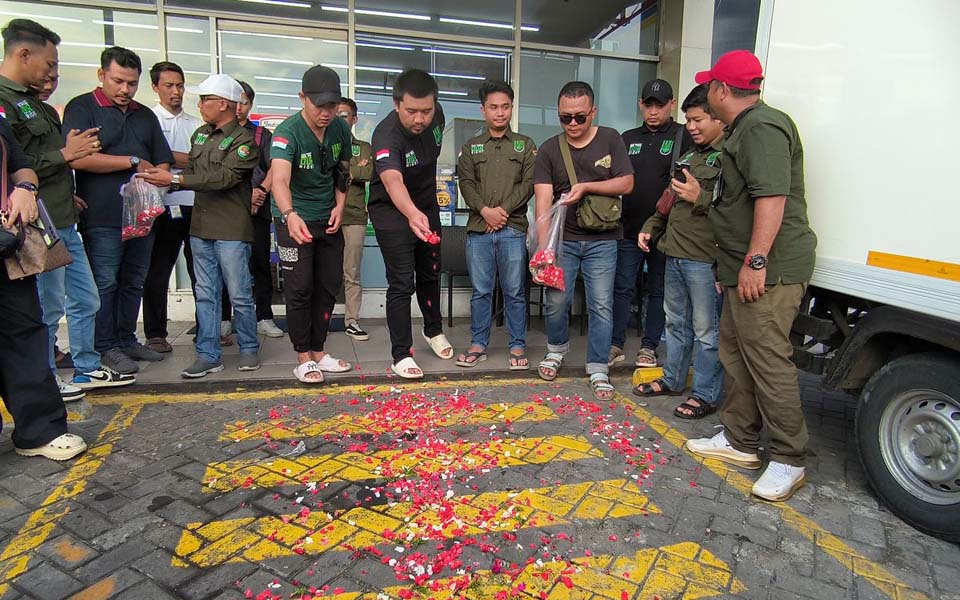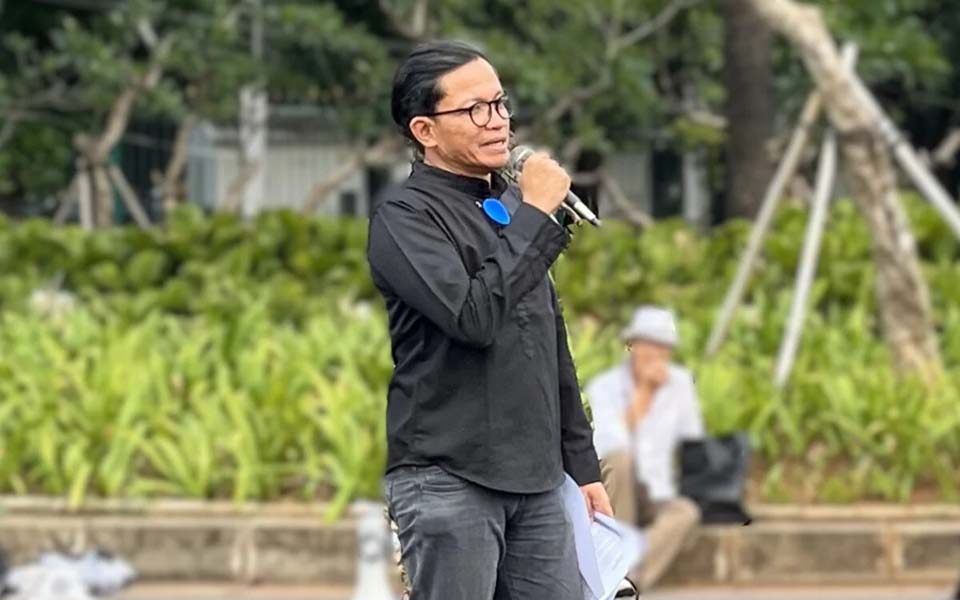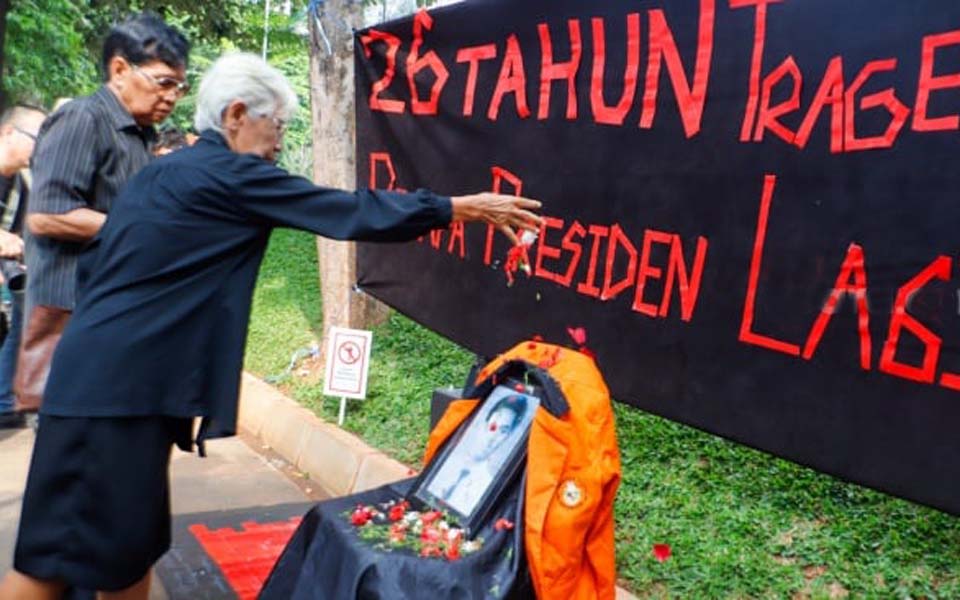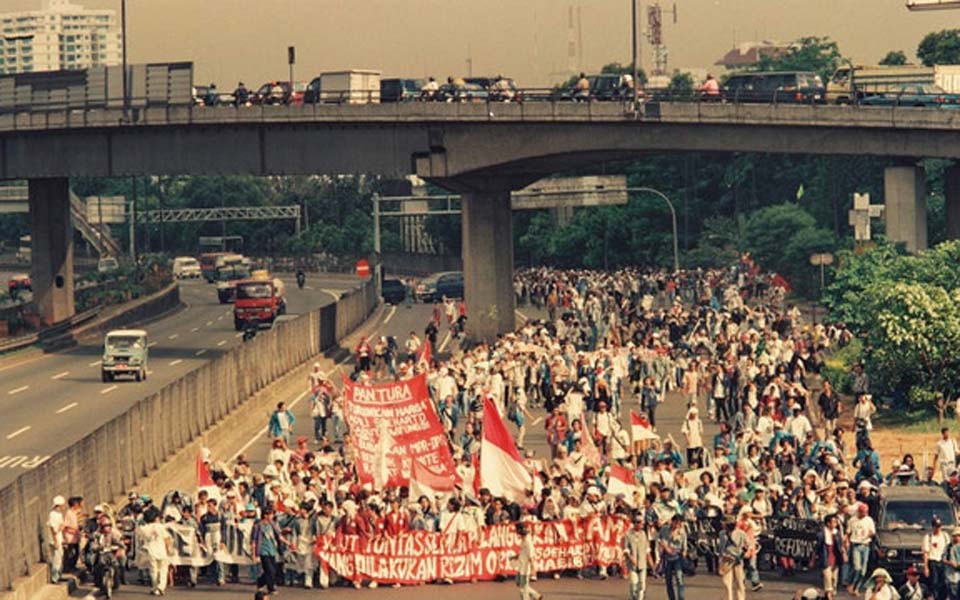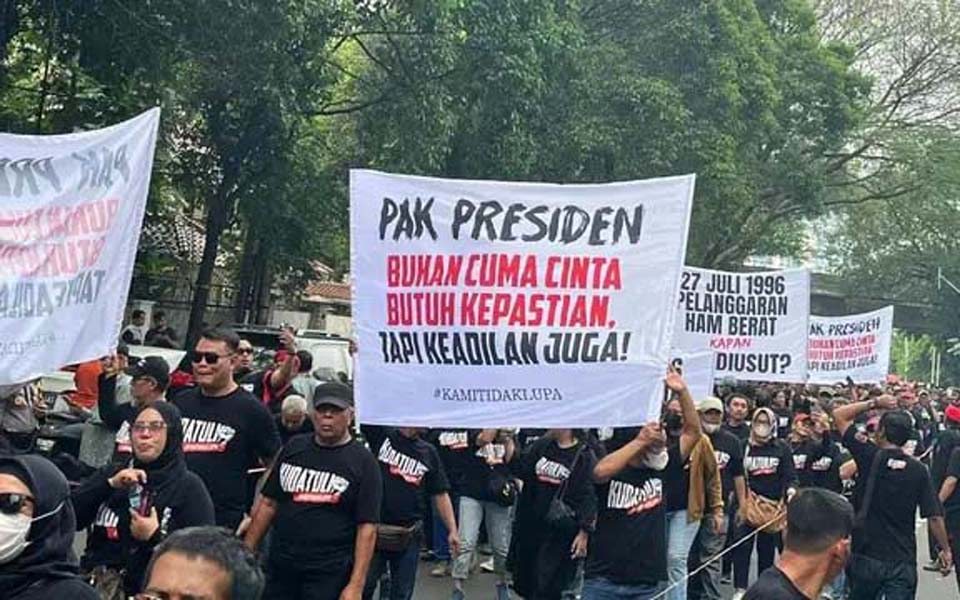Windoro Adi – “We are grateful that the government has finally acknowledged our fallen son a hero of reformasi. They did not die in vain”, said Hiratetty, the mother of Elang Mulia Lesmana at a press conference at the Trisakti University campus on Monday May 8.
Elang, Hafidhin Royan, Hery Hartanto and Hendriawan Sie were the four students shot dead by security forces on the grounds of the Trisakti campus on May 12, 1998. The shooting that afternoon triggered mass anger against the New Order regime and precipitated the riots in and around Jakarta on May 14 that culminated in the resignation of former President Suharto on May 21. The Jakarta riots left the capital city in flames – not to mention those who died.
The wave of reformasi changed the Indonesian political constellation, including the “fate” of the activists and politicians that struggled for reformasi together with students. Amien Rais, who even became known as the Father of Reformasi, was chosen to be the speaker of the People’s Consultative Assembly (1999-2004), KH Abdurrahman Wahid and Megawati Sukarnoputri were chosen as president and vice president respectively.
For the activists that struggled to bring down the authoritarian power of Suharto however, life has changed little, including for the parents of the four Trisakti students that were shot dead. It was not until last year that President Susilo Bambang Yudhoyono bestowed the Dedicated Service Award on the four, a dedication affirmed in Presidential Decree Number 057/TK/2005 dated August 9, 2005.
At the press conference on Monday, Karsiah Sie, the mother of Sie, admitted to being proud of the acknowledgment and award from the government. However it is as if accountability for the death of the four students – cut down in a hail of hot lead by security forces – is yet to be realised. “We are tired, to this day it has been as if the government and the DPR [House of Representatives] have never been serious about investigating and solving this case. Eight years have now passed. We are tired of promises, particularly from the DPR”, said Hiratetty.
In fact the people’s movement to bring down the New Order regime had emerged four years before Suharto’s downfall, that is during the wave of democratisation that swept through Eastern Asia. “The democratic movement in Myanmar with Aung San Suu Kyi-nya inspired the pro-democracy movement in Indonesia”, says Budiman Sudjatmiko, one of the founders of the People’s Democratic Party (PRD) who was also jailed by the New Order.
The wave of democratisation started with demands to revoke a packet of five political laws1. The abolition of this packet of laws was frequently articulated by PRD activists and other elements of the movement. The PRD – who at that time were called the People’s United Democracy – was launched by a number of activists including Sugeng Bahagyo, Dita Indah Sari and Widji Thukul. Thukul was a poet who disappeared [and is presumed dead] and was never able to enjoy the fruits of the reform that he struggled for.
According to Sudjatmiko, the change from the PRD into the People’s Democratic Party was declared on April 15, 1996. Aside from the PRD, other groups also surfaced in 1995 struggling to breakdown the rigidity of the New Order political system included the New Indonesian Nationalist Party (PNI Baru), the New Indonesian Christian Party (Parkindo Baru) and the New Masyumi.
Daniel Dhakidae in the book Indonesian Political Parties, Ideology, Strategy and Program (1999) says that the blow delivered by the PRD and the Indonesian Democratic Union Party (PUDI) were able to create an opportunity for wholesale change to Indonesia’s political map and political party politics. They tore down the regime’s basis of legitimacy. “The two became the pioneers, the trail blazers, [taking] the world of modern Indonesian party politics towards the changing century” wrote Dhakidae.
The resistance by youth activists was confronted by repression from the New Order. A number of PRD activists including Sudjatmiko, were charged with masterminding the Jakarta riot that followed an attack by security forces on the central offices of the Indonesian Democratic Party (PDI) on Jl. Diponegoro that became known as the July 27 incident2. They were charged with committing acts of subversion and incarcerated in a number of jails across Indonesia. Likewise, PUDI leader Sri Bintang Pamungkas was also jailed. They were only released after Suharto resigned and was replaced by Vice President B.J. Habibie.
Many of these student and party activists have now gone their own ways. Sudjatmiko, who was able to continue his studies at the University of London immersing himself in the field of politics and economy and international relations at Cambridge University through a scholarship from the Ford Foundation, has now joined the Indonesian Democratic Party of Struggle (PDI-P). He also heads up a research institute.
Former PRD general secretary Petrus Haryanto now manages a small publishing business. Dita Sari is now the chairperson of the PRD and is also active in labour organisations. Thukul’s fate remains unknown having vanished along with a number of other activists3.
Sudjatmiko still dreams of the ideals he held when he established the PRD which are far from the realities that exist now. “I imagined the downfall of the New Order, like the classic downfall of dictators in other countries, but it never happened”, he says. “There was no Lustrasi4 like in Czechoslovakia, no transnational justice. I realise that the dreams I had when I participated in founding the PRD turned out not to be [so] easy [to realise]”, he says.
The fruits of reformasi
The coalition of student and people’s organisations that occupied the DPR and the city’s streets were one of the factors that caused the fall of Suharto.
Prasetyantoko and Wahyu Indriyo in their book The Student and Democratic Movement in Indonesia (2001) say that student groups had an awareness of the poor relationship between the state and society. Initially, the resistance that came to the surface was a cultural resistance, both in the form of artistic offerings as well as a more open lifestyle. Within a short period this resistance changed into political activities that bore fruit.
Reformasi indeed succeeded in two ways: there were those who benefited and those who were hurt. Some of the demonstrators are now sitting sweet as people’s representatives at the parliament building in Senayan. Several times now they have witnessed the parliament’s gates being broken down by demonstrators. Other demonstrators chose to continue to build a bases in rural areas and play a very small role. Some were simply allotted the role as job seekers or the followers political parties. There are also those who have now become commissioners of companies or legal attorneys.
The lives of the families of the Trisakti, Semanggi I and Semanggi II victims have also changed little. Ho Kim Ngo (56), the mother of the late Yun Hap, a University of Indonesia student who was shot dead during the Semanggi II incident, is now languishing. “Yeah, above all I want to work, [I’m] old. At most just washing, shopping for vegetables. Just looking after the house”, said the woman who has given birth to three children.
This afternoon, Wednesday May 5, she and the Tionghoa Association (Chinese Association) intend to visit Yun Hap’s grave in Pondok Rangoon, East Jakarta. “The plan is to go to Hendriawan Sie’s grave at the same time. [We’ve] been doing this every year”, said Ngo.
Now she lives with her two children, Yun Yie and Ling-Ling, in their own house in the Tanjung Duren area of West Jakarta, after years of only being able to rent accommodation.
Martini, the mother of the late Sigit Prasetyo, a student of the Indonesian Administration Foundation who was killed in the Semanggi I incident, is increasingly busy working with her husband, Asih Widodo, to find additional income as they are currently building a new house in the Tanah Kusir area.
Martini will do any kind of job, working as a housekeeper, looking after children and the elderly or running a laundry service. Her husband is no less busy as a freelance construction worker.
Hiratetty is still alone after her husband who was affectionately known as Pak Boy died after a protracted illness. She now lives in a house with her two daughters and is still a member of the New Indonesia Party.
Karsiah Sie, works at a cooperative near the Trisakti University. This afternoon she is busy arranging a supply of goods for the cooperative. “Later on this afternoon, I have an appointment to be interviewed by a journalist from a television station. It’s customary, [I’m a] regular at each commemoration of Reformasi Day”, said Karsiah.
Sumarsih (54), the mother of the late BR Norma Irmawan, formerly a student of the Atma Jaya Catholic University that was shot in the Semanggi I incident on Friday November 13, 1998, is dressed simply in black – a colour that contrast with her hair which has turned almost entirely white. She is also persisting with demanding responsibility from the state for the Trisakti and Semanggi I and II killings. Sumarsih, who won the Yap Thiam Hien Award even threw eggs during a protests at a DPR plenary meeting that was debating the DPR’s position on Trisakti and Semanggi.
The group of families of the victims of the May riots5, who have obtained the assistance Kontras (the Commission for Missing Persons and Victims of Violence), are trying to survive the difficulties of their lives. Some of them have tried to open small shops together, making snack food and pouches for cell phones. “Most of them are families of the victims of the May riots at the Jogya Department Store in Klender”, said Kontras coordinator Usman Hamid.
They and the activists and people who served to bring down the New Order are now waiting out the days and waiting in hope. The hope is the coming of justice. And, they who are enjoying the fruits of reformasi cannot of course forget those who were left behind. It would not be proper if those who are enjoying the fruits of reformasi suffer amnesia. Likewise also for the ordinary people. It may be appropriate to scrutinise what was written by Milan Kundera in the book The Book of Laughter and Forgetting. “Humanity’s struggle against power is humanity’s struggle against forgetting. Including being forgotten by the forces that do not want to deal with the past!” (Budiman Tanuredjo)
Notes:
1. The five repressive political laws were passed in 1985. They allowed only three recognised political parties; banned party activity from villages and small towns; allowed the government to appointment of 575 non-elected members (75 representing the military) to the People’s Consultative Assembly (MPR); imposed a single state-defined ideology on all social, political and cultural organisations; and give the state the right to intervene in the internal affairs of organisations.
2. July 27 – Following Megawati Sukarnoputri’s popular election as chairperson of the Indonesian Democratic Party (PDI) in 1996, the Suharto regime, who feared a PDI lead Megawati (who could draw upon the tremendous popularity of her father Sukarno, the founding president of Indonesia) might threaten the state party Golkar’s dominance in the upcoming 1997 elections, sponsored a rebel PDI congress in Medan, North Sumatra, and succeeded in replacing her with their own pro-regime candidate, Suryadi. Following weeks of protests and the occupation of party’s headquarters in central Jakarta by pro-Megawati PDI supporters, on July 27 paid thugs backed by the military attacked and destroyed the PDI offices resulting in the death of as many as 50 people. Popular outrage at the attack sparked several days of mass rioting and violent clashes with police which was blamed on the People’s Democratic Party, who’s members were hunted down and arrested as the masterminds behind the riots.
3. Between 1997 and 1998 as many as 14 pro-democracy activists were abducted by members of the elite special forces Kopassus. After extended periods of detention – in many cases the victims were severely tortured – most were released although four remain missing and are presumed dead. In April 1999, 11 low-ranking Kopassus officers were tried by a military court for the kidnappings and given sentences of between a year and 22 months in prison, although six of them were allowed to remain in the army.
4. Lustrasi – Laws prohibiting government officials of certain levels from a previous regime from holding office or being nominated for election for five years.
5. May 1998 – Following by the fatal shooting of student protesters in Jakarta in May 1998, mass rioting broke out resulting in the death of as many as 1 thousand people eventually leading to the overthrow of Suharto.
[Translated by James Balowski.]






